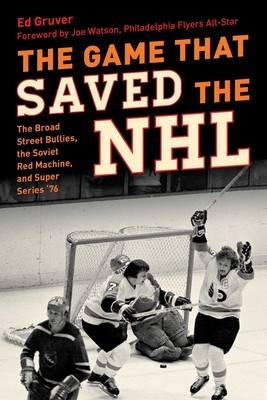
- We will send in 10–14 business days.
- Author: Ed Gruver
- Publisher: Lyons Press
- Year: 2023
- ISBN-10: 1493074970
- ISBN-13: 9781493074976
- Format: 15.5 x 21.8 x 3.1 cm, hardcover
- Language: English
- SAVE -10% with code: EXTRA
Reviews
Description
In late 1975 and early 1976, at the height of the Cold War, two of the Soviet Union's long-dominant national hockey teams traveled to North America to play an eight-game series against the best teams in the National Hockey League. The culmination of the "Super Series" was HC CSKA Moscow's face-off against the reigning champion Flyers in Philadelphia on January 11, 1976. Known as the "Red Army Club," HC CSKA hadn't lost a game in the series. Known as the "Broad Street Bullies," the Flyers were determined to bring the Red Army team's winning streak to an end with their trademark aggressive style of play. Based largely on interviews, Ed Gruver's book tells the story of this epic game and series as it lays out the stakes involved: nothing less than the credibility of the NHL. If the Red Army team had completed its series sweep by defeating the two-time Stanley Cup champion Flyers, the NHL would no longer have been able to claim primacy of place in professional-level hockey. Gruver also describes how the game and series affected the styles of both Russian and NHL teams. The Soviets adopted a more physical brand of hockey, while the NHL increasingly focused on passing and speed.
EXTRA 10 % discount with code: EXTRA
The promotion ends in 20d.23:28:16
The discount code is valid when purchasing from 10 €. Discounts do not stack.
- Author: Ed Gruver
- Publisher: Lyons Press
- Year: 2023
- ISBN-10: 1493074970
- ISBN-13: 9781493074976
- Format: 15.5 x 21.8 x 3.1 cm, hardcover
- Language: English English
In late 1975 and early 1976, at the height of the Cold War, two of the Soviet Union's long-dominant national hockey teams traveled to North America to play an eight-game series against the best teams in the National Hockey League. The culmination of the "Super Series" was HC CSKA Moscow's face-off against the reigning champion Flyers in Philadelphia on January 11, 1976. Known as the "Red Army Club," HC CSKA hadn't lost a game in the series. Known as the "Broad Street Bullies," the Flyers were determined to bring the Red Army team's winning streak to an end with their trademark aggressive style of play. Based largely on interviews, Ed Gruver's book tells the story of this epic game and series as it lays out the stakes involved: nothing less than the credibility of the NHL. If the Red Army team had completed its series sweep by defeating the two-time Stanley Cup champion Flyers, the NHL would no longer have been able to claim primacy of place in professional-level hockey. Gruver also describes how the game and series affected the styles of both Russian and NHL teams. The Soviets adopted a more physical brand of hockey, while the NHL increasingly focused on passing and speed.


Reviews